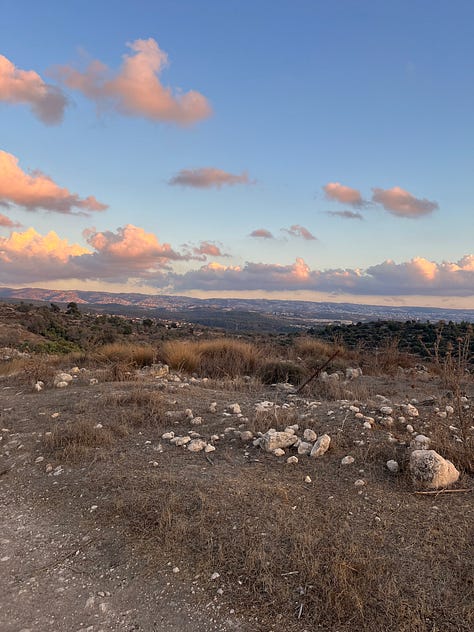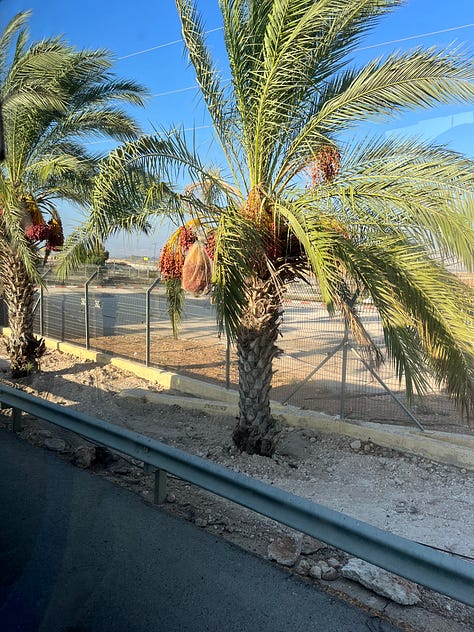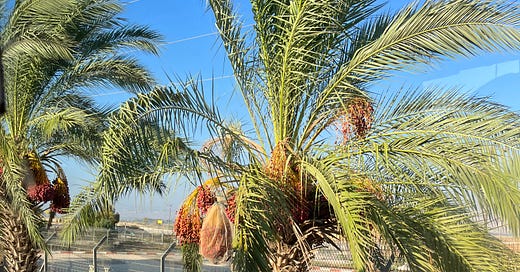The Perfect Place for Imperfect People
Israel is for those who want to become better.
Healthy Israel - part 4 of 6
(You can find the first three parts in the Natural Israel section of The Healthy Jew.)
Dear Healthy Jew,
Jewish tradition teaches that:
God is whole and perfect.
God’s word, the Torah, is whole and perfect.
The spirit of God’s nation, Israel, is whole and perfect.
But unlike God, the Torah, and the spirit of the nation, the individuals that compose God’s nation - you and me - are flawed and fallible mortals.
Two Sets of Tablets
That wasn’t always the plan.
When God gave the Torah at Sinai, we were meant to unite with its wholeness and perfection. Had we received the Ten Commandments as God carved them into stone, our stone-based bodies would have transcended sin, suffering, and death.1
But 40 days after the Revelation, where God said “no” to idol worship, we said “yes” to a certain golden calf, and we lost our oneness with God and Torah.
No wonder God considered destroying Israel (Shemos/Exodus 32:10). We had failed our mission of reaching wholeness and perfection.
What happened next?
Had God created the world because logic required more whole and perfect beings, that calf would indeed have ended the Jewish experiment.
Thankfully, God created the world because God wanted you and me. God also wanted Israel because God wanted Israel. No golden calf can revoke God’s will.2
Therefore, the endgame of the golden calf saga was God teaching Moshe (Moses) the principle of repentance, and we received a second set of stone tablets - carved by an imperfect human (Moshe) - on Yom Kippur.
Repentance is a second path to God, not a copout.
Repentance doesn’t pretend that wrongs didn’t happen, but allows us to live with imperfections. God wants you and me - and we earn existence by wanting God, and doing our imperfect best to know and emulate His ways.
Finding God in Israel
The whole and perfect Jew would have lived on earth as if he was in heaven, because the wall between body and soul was lifted when he saw God on Sinai.
But the flawed and fallible Jew’s feet are planted squarely on earth, trudging along the best that he can, sometimes succeeding, sometimes failing. This Jew finds God in the corner of the material world that talks God’s language: the Land of Israel, the body of the Jewish people.
Israel is a land of rocks, rivers, plants, and animals. But it’s also God’s home on earth, and the home of the earthbound Jew.
The Spies Ruin Everything
Therefore, had we marched from Mount Sinai straight into Israel, towing along the broken God-formed first tablets and unbroken man-formed tablets, we would have found complete forgiveness from the golden-calf debacle.
Unfortunately, we lost that too. When the failed spies returned with tails of scary giants, we cried that we want to return to Egypt instead of settling in Israel. On that day, many years later, both Temples were destroyed.
In King David’s words (Tehillim/Psalms 106):
They were disgusted with the Cherished Land; they didn’t believe His word. He lifted His hand on them, for them to fall in the desert, and for their descendants to fall in the nations, and be scattered among the lands.
But All is Not Lost
Perfection is gone, because we are no longer perfect. But wanting remains, because we can always want to be better and closer to God’s will and word.
Moshe’s (Moses) failed spies cried that Israel is a “land that eats its inhabitants.” Whenever we wish, we can join the response of Yehoshua (Joshua) and Calev (Caleb): “the land is very, very good!” These two men are our links to Israel the Land, and from there back to the Torah we received on Sinai.
“Moshe received the Torah on Sinai, and transmitted it to Yehoshua, and Yehoshua to the Elders…”
Do You Want Israel?
Therefore, during these challenging times in Israel, we must sometimes exchange, if only for a minute, the images of pain and fear with pictures of purpose and hope. We can’t let go of yearning for the Land.
In one of the Kuzari’s most fascinating dialogues, the king of the Khazars blasted the Jewish sage for singing Israel’s virtues:
If so, you’re too lazy to fulfill your Torah’s obligation. You don’t move to this place, making it your house in life and death, but you still pray: “Have compassion on Zion, because it is the house of life.”… Your bowing and prostrating towards it are either hypocrisy or mindless rituals.3
And the sage accepted the censure:
You have rebuked me, king of Kuzar. This sin prevented us from completed God’s aim with the Second Temple, when He said: “Sing and rejoice, daughter of Zion.” God’s presence4 was ready to return like before if they had all answered the call to ascend [to Israel] with heartfelt desire.
Instead, only a few answered, and most of them - including their dignitaries - remained in Babylonia, satisfied with servitude so long as they won’t need to leave their homes and status… Had we willingly greeted the God of our fathers with a full heart, we would have been helped like our ancestors in Egypt.
[Today,] our saying “bow to His holy mountain,” and “He who will return his presence to Zion” (and more), are like the chirping of a parrot. We don’t know what we’re saying, just as you said, ruler of Kuzar.5
Why are Jews still scattered and persecuted? Why is antisemitism - again - erupting everywhere? Because we don’t want to leave our comfortable corners to unite in God’s land and live in God’s presence.
In the final pages of the Kuzari, the Jewish sage practices what he preached, and sets out on the arduous journey to Israel.6
In his final words, the sage explains:
“Get up, have compassion on Zion, now is time for mercy, the time has come! Because your servants want its stones, and it’s earth they seek” (Tehilim/Psalms 102:14).
Jerusalem will be built when the people of Israel yearn for the Land, seeking its stones and earth.7
Israel’s path to lasting peace and security isn’t through every Jew becoming a perfectly spiritual person. All we need is to want to know God in the perfect land for imperfect people.



Thank you for reading Healthy Jew.
Here are 2 great paths to continue the journey:
Also check out this intro and index to explore hundreds of posts about our 3 Healthy Jew topics: Wellness with Wisdom, Land of Life (Israel), and Sensible Spirituality.
Finally, always feel free to reach out here with any comments, questions, or complaints:
I look forward to hearing from you!
Be well,
Rabbi Shmuel Chaim Naiman
The Hebrew word for “carved” (charus) can be read as “freed” (cheirus). And so teach the Sages: God’s carved word was meant to free us from all limitations.
Of course, all God’s actions have reasons - but we don’t know them. As far as we’re concerned, God’s wisdom and will are one and the same.
Kuzari 2:23
I imprecisely translated the Kuzari’s common term inyan elohi (literally: the subject of God) as “God’s presence,” because I couldn’t think of anything better.
Kuzari 2:24
Apparently this passage represents the book’s author, Rabbi Yehuda Halevi, who migrated to Israel at the end of his life.
Kuzari 5:27







TY for the wonderful inspiration!